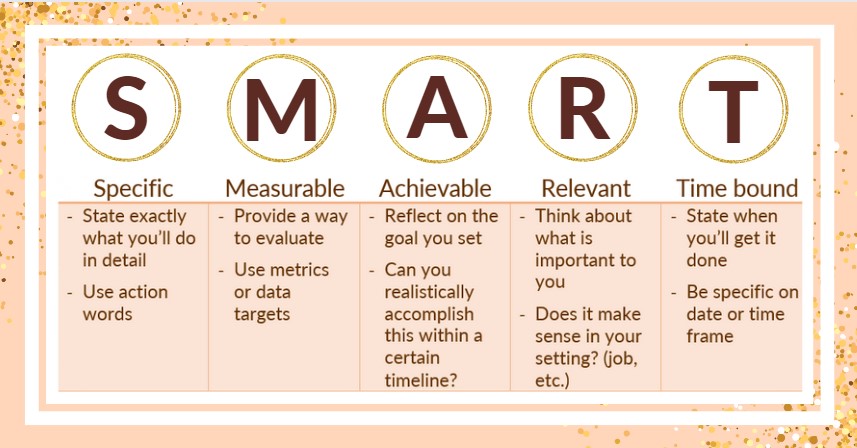How to set SMART goals for your English learning success
Why we set goals

Are you a bit lost in your language learning like Alice was in the ‘Alice in the Wonderland’ story? As The Cat wisely remarked, if you don’t know where you want to get to, then it doesn’t matter which way you go about it. You are not likely to get to where you needed to be anyway…
But if you know exactly where you are going and how to get there, there is not much that can stop you from getting there quickly and efficiently!
Instead of aimless wandering around, goal setting allows you to precisely visualize what needs to be done and how to accomplish it. What’s more, there is a trick to setting your language learning goals right. You have to be SMART about it!
So let’s talk about what you need to consider when thinking about setting goals for yourself…
Your goals need to be:

Specific
“I want to improve my English” is not a goal. That’s a wish.
What particular skill are you trying to improve? Who do you need to talk to in English in real life? Are you preparing for a specific event like a meeting or a presentation?
Example:
-

“I want to be fluent in English.”
-

“I want to have a wide range of phrases available when emailing my company’s customers about our products.”
Measurable
How will you know you have achieved your goal? Can you measure it somehow?
I.e. you will know you have completed your goal of not being shy when speaking to your colleagues when you start initiating conversations with them because you have worked on your attitude; You don’t mind so much making mistakes any more, as long as you get your point across, and you have practiced phrases, topics, and ideas for small talk so you are ready to take the challenge on.
Another example of a measurable goal:
-

“I will learn more vocab to do with my work.”
-

“Every week I will learn 20 new words/ phrases related with HR and use them in phrases when speaking to my colleagues and boss to remember them.”
Achievable
Your goal does have to be ambitious so your cause is worthy. Aiming at small things doesn’t make you excited or proud.
However, your goal still has to be achievable. If it is too hard, it will result in you getting frustrated and demotivated. Be realistic about what you set out to do. Consider your workload, availability, and commitments. If your goal is massive and you will need an hour or two every day to make it happen, is that realistic? I personally don’t know anyone who has that kind of time…
Equally, it is always a good idea to break a big, long-term goal into smaller, more achievable, short-term goals – into particular steps you will take towards your goal while making the big stuff happen. This will keep you motivated and you are more likely to keep going, feeling accomplished along the way.
E.g.: My big goal is to start thinking in English so that I can stop translating in my head and can answer faster, taking part in the conversation at a good speed, and feeling like the professional I am during our company meetings.
-

“I will be fluent in English, thinking without having to translate, ready for next month’s meeting.”
-

“I have stopped translating every sentence in my head and instead I participate in meetings boldly in conversation as I do in my first language.” (9 months goal with a date)
- I start listening to podcast and videos which include the language (vocabulary) I normally need in the meeting setting so I have heard it many times and I am confident in it.
2. I write new vocabulary down and I actively practice it in conversations.
3. I practice at home for any presentation or meeting coming up so that I am confident and the situation feels familiar.
4. I make new friends online or in real life with whom I can practice small talk and conversation so that when I meet new people in a meeting, the conversation is much easier for me.
5. I work on my mindset to stop avoiding conversations in English at work. My professional opinion matters and I always manage to get my idea across.
6. In our next company meeting, I will practice engaging with my colleagues instead of avoiding conversations. In every meeting after that, I will build upon the communication and relationships from before.
Relevant
Does your goal make sense in terms of what you need to achieve?
Your goals should always be relevant to how you are intending to use the language. E.g. if you need to be communicating with your clients, go research about your clients, their company, how to make small talk and how to write emails. Don’t study the language for opening business meetings. Set your goals for your specific needs.
Example:
-

“I will improve my general business English.” (- even though your goal is to improve relationships with your colleagues from abroad)
-

“I am be able to confidently to have a small talk at the beginning of meetings with my colleagues from Germany and Croatia.”
Time bound
Give yourself a deadline. Set a date by which you want to achieve this particular goal.
Your short term goals may be a week, a month, or up to 3 months.
Your long term goals may be around a year or more. But you alone decide how fast you work and when you need your desired results by…
-

“I will improve my emails writing.”
-

“In the space of the next 8 weeks, I will start using new emailing phrases focusing on different aspects every week (week 1 opening phrases, week 2 phrases for the main body of the email including for adding attachments, week 3 apologising phrases if something goes wrong, …, week 8 closing phrases and final greetings).”

So now what?
Writing a smart goal is like painting a picture of the future, the reality you want to see by a certain time in the future. A goal is not a to-do list. It is a reflection of what you want to be able to do. A task list will help you to achieve your goal, but it is not the goal itself.
So you don’t say:
-

“I will read my favourite book every day and listen to podcast every Monday and Wednesday and write new words down to learn more vocabulary.”
Instead, you will say:
-

“I am learning 10 new words every week and moving them into my active vocabulary.” (read here for more information)
(And this is how you do it: you read your favourite book in English every day, write interesting new words down, listen to podcast on Monday and Wednesday, write new words down. You sit down at the end of the week, go through all of them, decide which 10 you want to learn next week and how exactly you will use them in conversations so that you remember them properly…)
Some people start their goals with ‘I will be able to/ have learnt…’ but it is good to use present tense when setting your SMART goals, also starting with by when you want them to be achieved – e.g. “by September 2023 I can”, “every Sunday I do”, “by the end of 2023 I am able to…” This makes you feel like the things are already happening, you are already doing/ feeling/ achieving the things you said you would. This will give you more of a kick than the uncertain future ‘I will’ – maybe one day… or maybe not, we’ll see..
Also, SMART goals do not have to be expressed in one sentence only. On the contrary, often you will need 2 -3 sentences to cover all your basis.
Here is an example of a well-balanced SMART goal:
“In 6 months’ time (by: date) I am able to confidently present my ideas for improvements to my colleagues at work, including explaining the resolutions of financial and accounting problems. When I don’t remember the correct word, I explain myself and get my idea across. I feel confident that I handled the situation instead of being nervous about not remembering certain words.”
- The objective is specific – it tells you exactly in what situations you will be able to communicate, how you will feel about it, and how your mindset will change.
- It is measurable because you can tell if you are happy to talk to your colleagues or if you are still trying to avoid speaking to them You can also tell if you started explaining yourself when you forgot a particular word or if you panicked and were not able to continue speaking at all because of this one word that slipped your mind.
- It is achievable but ambitious – 6 months is a very reasonable time to be able to change your mindset and get comfortable with approaching old situations in a new way. But it is ambitious because it requires quite a bit of work on yourself and your language skills.
- It is relevant – you are talking directly about situations that you experience at work, not about general improvements that could suit just about anyone.
- Time bound – you gave yourself a time frame by which you want this goal to be achieved.

What you potentially need to consider next is to set a goal for the different skills that a language is composed of: speaking, listening, writing, and reading. You can also set yourself a goal for vocabulary learning, grammar learning, or revision of what you have learned previously. Be as specific as you can with these goals. You do not need a goal for each, only those that are relevant to you. Perhaps you are really good at listening because you watch movies and listen to podcast all the time. But you never speak. In this case, you do not need to set a goal for listening but you definitely do need one for speaking… Think about what skills are most relevant to you.
Wanna practice? Try it here:

So…be SMART and make your English dreams come true…
PS: If you are ready to make your goals happen but you are not sure how to start incorporating more English into your daily life, click here for some useful ideas:

